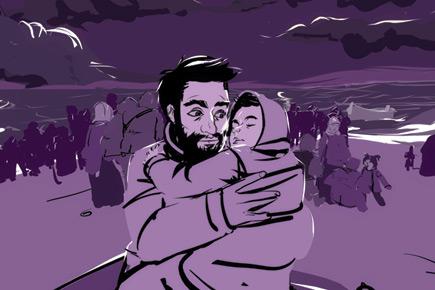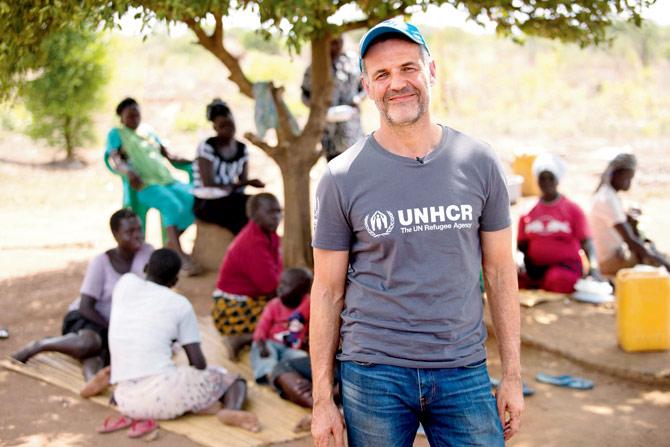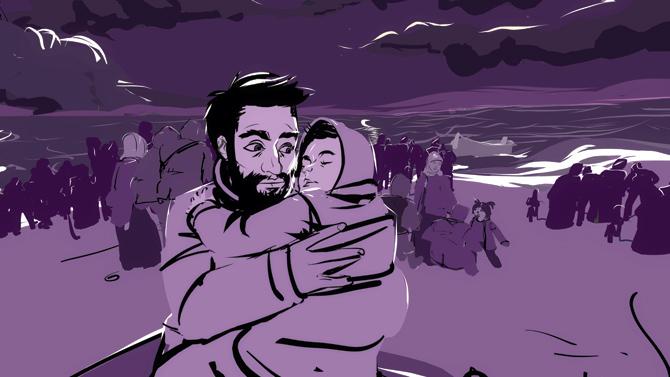No matter how dark the stories he encounters, Khaled Hosseini finds hope in telling them. His latest short story Sea Prayer, inspired by three-year-old Alan Kurdi, is now an animated VR film


UNHCR Goodwill Ambassador Khaled Hosseini at a refugee camp in Uganda. Pic/Jordi Matas, UNHCR
Four minutes was all Khaled Hosseini had to tell the story, Sea Prayer, when he was asked to speak at a private fundraiser to benefit refugees, back in March. The story is written in the form of an imagined letter, from a Syrian father to his son, who is lying asleep on his lap the night before the sea crossing to Europe. Hosseini, Goodwill Ambassador for UNHCR (United Nations High Commissioner for Refugees), wrote it to commemorate the second anniversary of three-year old Syrian boy Alan Kurdi's death after he drowned in the Mediterranean Sea while attempting to reach Greece.
ADVERTISEMENT
The four-minute read has now been made into an animated short film by UNHCR and The Guardian VR team. It was created using Tilt Brush, a 3D painting tool, by artist Liz Edwards.

Sea Prayer can be viewed on https://www.unhcr.org/khaled-hosseini
Speaking to us over the phone from his home in San Jose, California, the Afghan-born American novelist says, "As a father of two, when I saw the photo, what I thought of was all the unseen work it takes to raise a child. What it takes to to make sure they are safe, happy, that they get proper education, that they sleep well. So many sacrifices you make for your children, and then to see all that work lying face down in a foreign beach in a foreign country. I just imagined what it would be like to be the father (God forbid) talking to his son, the night before putting him onboard a boat full of smugglers and traffickers, whose business model thrives on human misery. The paltry choices that a person must be left with, to decide that this is the best course of action. That speaks of the level of desperation, and it is not one family. That image has become an emblem of the refugee crisis that has unfolded in the Central Mediterranean."
Hosseini, who was in Northern Uganda earlier this year, has been working with UNHCR since 2006, to raise awarenessabout the challenges faced by refugees. "I was 11 when I came to the US from Afghanistan, as an asylum-seeking refugee myself. Through the '80s and '90s, I saw the refugee crisis unfold in Afghanistan to become one of the worst in the world. The work we do is important, especially here in America, where there is a lot of divisive dialogue around refugees. I think it behooves all of us to help those countries that are hosting refugees, and those are largely developing countries that already have enormous problems of their own."
Often the stories he encounters at refugee camps are emotionally taxing. Is it hard to stay optimistic? "One would imagine it to be so, but, it is quite the opposite actually. I feel so inspired by their resilience, resourcefulness and kindness towards each other. And then I see people on the ground, youngsters, in the prime of their lives, choosing a life in these corners of the world. Yes, some of the stories are emotionally taxing, but the inspiration I feel far exceeds that."
He may have been writing about Afghanistan, refugees, war and conflict, but Hosseini doesn't see himself as an educator. "I never set out to write to teach people something. I think that's the wrong way to go about it, because the agenda takes over the story. My purpose is to write stories that speak to me. I write really for myself. It's a process of exploring a character in certain circumstances, give it my own language, emotions, thoughts and see where it goes. And, hope that it connects to others as well — I have been quite fortunate with that. But, I don't see myself as a spokesperson for any particular cause. I do put on that hat while speaking on behalf of refugees. But, I think it is important to take off all hats, when you sit at the table to write."
 Subscribe today by clicking the link and stay updated with the latest news!" Click here!
Subscribe today by clicking the link and stay updated with the latest news!" Click here!







